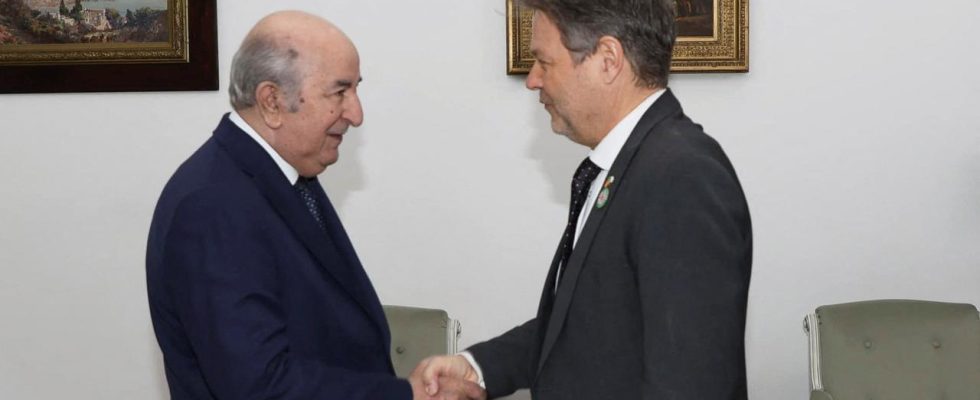Germany and Algeria want to work more closely together in the energy sector. The visit by Federal Economics Minister Habeck made it clear: The will is there – but is it enough?
It is probably no coincidence that the business delegation from Germany is shown the gigantic, newly built mosque in the middle of the Algerian capital Algiers. A German architectural firm finally designed the new building.
The huge new building exudes self-confidence and is ultra-modern. Solar cells on the roof provide energy, as does harvested rainwater. The organizers’ message: Just like Germany, Algeria is also relying on renewable energies.
Renewable energies in the foreground
The business delegation accompanying Robert Habeck comes almost exclusively from the renewable energy sector. The Federal Government is very interested in working more closely with Algeria in this field.
Almost in disbelief, Robert Habeck talks about how great Algeria’s potential is to produce the forms of energy of the future. Energy from the sun and hydrogen in particular could be produced in gigantic quantities in the sun-rich country. The only thing is: it hasn’t happened yet.
Algeria as a partner?
But since Germany will need gigantic amounts of hydrogen in the future, it needs partners. What’s more: Germany depends on it. Algeria should become such a partner. The North African country offers a “unique opportunity,” says Marie-Luise Wolff.
She is the head of an energy supplier and also president of the Federal Association for Energy and Water Management. She should know what makes her professional colleagues tick. Dozens of German companies are already operating in Algeria.
They say they enjoy being here. But – to put it politely – it is not always easy.
Excessive bureaucracy as an obstacle
Change of location. Visiting the German-Algerian company Siemens Estrel. Area of expertise: digital systems for rail transport. Present in North Africa for almost 20 years and now with sales in the three-digit million range.
A success story – but not without its difficulties. The entrepreneurs from Germany who traveled with us listened attentively as they talked about the excessive bureaucracy, even from a German perspective, and the non-transparent Algerian administration, where bank transfers to Germany sometimes take more than a year.
Habeck also spoke about this with Algeria’s Minister of Industry. This promised improvement.
German stance in the Middle East conflict is an issue
And the geopolitical situation is also pushing onto the agenda for the Habeck trip. Specifically: the war in the Middle East. Algeria feels like part of the Arab world; the population is predominantly Muslim.
This fact, combined with its own painful colonial history, means that the country stands closely on the side of the Palestinians. Middle East expert Daniel Gerlach also observes this. His forecast: Strong German solidarity with Israel is likely to be a constant topic in Habeck’s talks in Algeria.
And so it happened. Habeck said afterwards that the conversation with the Prime Minister was almost exclusively about that. Both men understood each other’s positions, he explains. Both see a two-state solution as the only way out.
Moral pointing fingers are not welcome
In Algeria the state plays a major role. And so Roberts Habeck’s presence is important for that reason alone. From an Algerian perspective, deals with private companies are hardly conceivable without “political support”.
And Western countries have an additional problem. If they raise their moral finger too strongly, they are almost certain to receive a cold shoulder from the Algerians. The Algerian government wants to be perceived as an equal partner. True to the motto: What do we get out of doing business with you?
This question may have been asked. Middle East expert Gerlach is also sure that Germany has to offer something. Half of the Algerian population is younger than 30 years old. Work visas for Germany or the training of young Algerians by German companies could be something that attracts Algeria.
Because Germany is by no means the only country that is currently attracting the North African state. We hear that Italy is busy, and so is China.
And so it’s quite fitting that German architects planned the large new mosque. It would probably not have been built to this day without the help of Chinese companies.
Torben Ostermann, ARD Berlin, tagesschau, February 9, 2024 10:12 a.m

